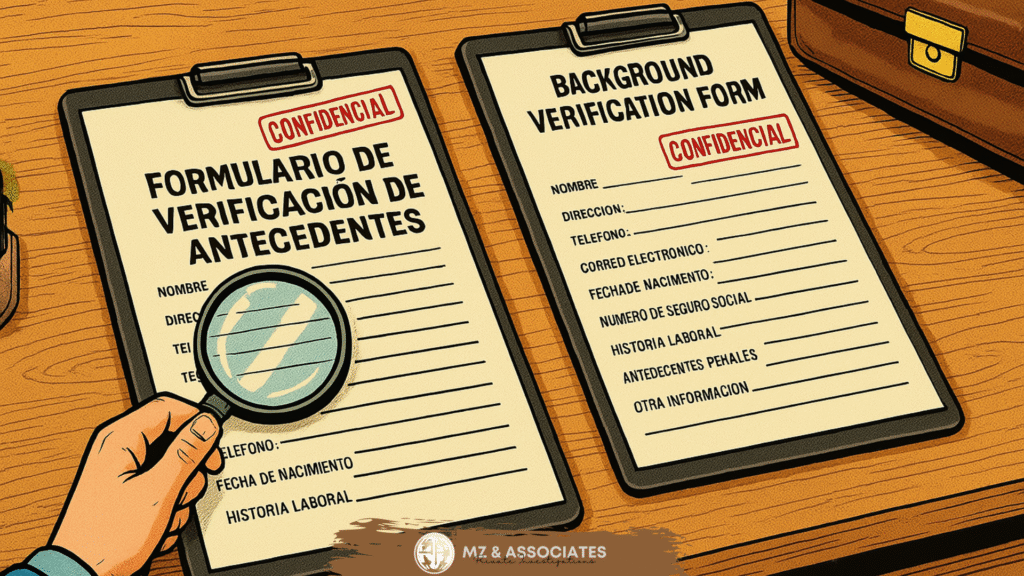
Bilingual Background Checks: Why Spanish-Speaking Workforce Needs Culturally Aware Screening
In today’s diverse workforce, language should never be a barrier to safety, trust, or opportunity. With millions of Spanish-speaking workers in industries like construction, hospitality, and manufacturing, businesses across the U.S.—especially in states like California—must adapt their hiring practices to meet these employees where they are. That’s where bilingual background checks come in.
But this isn’t just about translating paperwork. It’s about cultural respect, legal accuracy, and making sure every worker understands and feels confident in the process.
📈 The Growing Spanish-Speaking Workforce
Spanish is the second most spoken language in the United States. According to the U.S. Census Bureau, over 42 million people in the U.S. speak Spanish at home. In California alone, nearly 40% of the population is Hispanic or Latino—a number that reflects directly in the workforce.
In industries like:
Construction
Agriculture
Logistics & Warehousing
Hospitality
Healthcare Assistance
Spanish-speaking workers are the backbone. So when it comes to hiring, onboarding, and background screening, offering bilingual services isn’t just helpful—it’s essential.
🔍 What Are Bilingual Background Checks?
Bilingual background checks go beyond simply translating forms. They ensure that the entire background screening process—interviews, documents, explanations, consent forms, and reports—are available in both English and Spanish.
These checks often include:
Criminal background searches
Employment verification
Identity and right-to-work confirmation
Drug testing procedures
Reference checks
Education verification
But in a bilingual format, this information is made accessible, understandable, and fair for Spanish-speaking applicants.
⚖️ Legal and Ethical Reasons to Offer Bilingual Screening
Failing to provide clear communication during the background check process can lead to:
Misinformed consent
Delayed hiring
Violation of labor laws
Perceived discrimination or unfair treatment
In fact, under Fair Credit Reporting Act (FCRA) regulations, candidates must be properly informed (and give written permission) before a background check is conducted. If an applicant doesn’t fully understand what they’re signing or what’s being done—it could result in legal complications for the employer.
Offering bilingual screening demonstrates:
✅ Legal compliance
✅ Ethical responsibility
✅ Respect for your workforce
✅ Commitment to DEI (Diversity, Equity, and Inclusion)
🧠 Why Cultural Awareness Matters
It’s not just about translating words—it’s about understanding context.
For example:
Some countries don’t keep the same kinds of employment or criminal records.
Cultural norms about what’s considered “normal” to disclose may differ.
Fear or mistrust of authority could cause some applicants to be hesitant unless the process is explained clearly and respectfully.
When private investigators or background check providers understand this, they can:
Ask better questions
Provide culturally sensitive support
Reduce misunderstandings
Build trust
At MZ & Associates, we provide background checks in both English and Spanish, with trained bilingual professionals who understand how to conduct screenings with both accuracy and empathy.
🧰 Real-World Application: A Construction Case Study
A California construction company struggled with delays in hiring because several applicants didn’t complete their background check paperwork. Why? The documents were only in English, and many applicants didn’t fully understand what was required—or were afraid of signing something they couldn’t read.
After switching to bilingual background checks and working with MZ & Associates, the company:
Reduced hiring delays by 40%
Boosted employee trust and participation
Ensured full legal compliance with consent forms
Improved retention rates among Spanish-speaking hires
👷♂️ Industries That Benefit Most from Bilingual Screening
Construction – Ensure all workers are properly screened and cleared for safety-sensitive roles.
Hospitality – Protect guest experiences with reliable, clear hiring practices.
Healthcare – Verify credentials and background for in-home or assisted-living staff.
Manufacturing – Maintain compliance and workplace safety standards.
Logistics & Trucking – Avoid hiring delays by streamlining screening for Spanish-speaking drivers.
🛡️ The Role of Private Investigators in Bilingual Background Checks
Private investigators bring a deeper layer of insight, particularly when:
Validating foreign credentials
Investigating discrepancies in work history
Detecting patterns of fraud
Confirming identity or aliases
Having bilingual private investigators on your team means you’re not missing critical information due to a language barrier. They can also communicate with references, former employers, or institutions located in Spanish-speaking countries.
💡 Key Takeaways
Offering bilingual background checks is not optional—it’s essential in today’s labor market.
It builds trust, ensures legal compliance, and improves efficiency.
Companies that invest in culturally aware hiring practices are seen as inclusive, ethical, and forward-thinking.
Private investigators add value by verifying complex histories, identifying fraud, and ensuring accuracy in every language.
📣 Final Thought
In an increasingly diverse workforce, being inclusive isn’t just the right thing to do—it’s smart business. Bilingual background checks are a critical tool to protect your company, your clients, and your employees—while sending a clear message:
We value everyone on our team.
